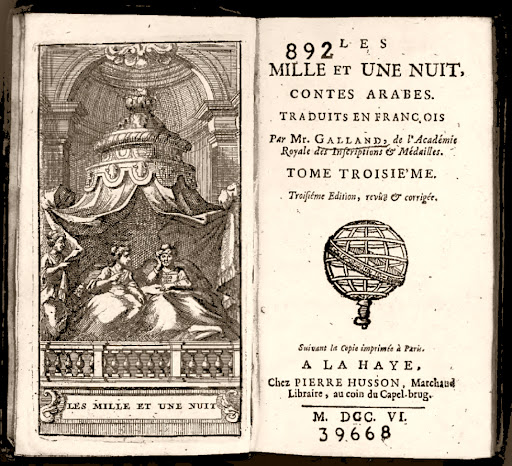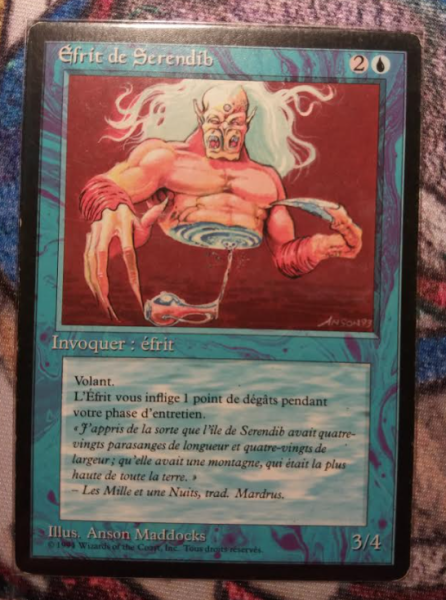Are you a Quiet Speculation member?
If not, now is a perfect time to join up! Our powerful tools, breaking-news analysis, and exclusive Discord channel will make sure you stay up to date and ahead of the curve.
When he reached the entrance of the cavern, he pronounced the words, ‘Open, Sesame!’
Ali Baba and the Forty Thieves
This is one of the most famous quotations from One Thousand and One Nights, a collection of folk tales from the Middle East also known as the Arabian Nights. It is easily among the most renowned magical phrases of all time, nearly at the level of "Abracadabra", and anybody would link it to the poor woodcutter Ali Baba. For Magic players, it is also the flavor text of Ali Baba, from Arabian Nights.
As such, it gives a perfect example of real-world flavor text, and it sounds like the best card to introduce a new setting, that of Middle Eastern folklore. After dealing with Greek and Latin literature the past two articles, in this new installment, we will analyze flavor texts made of excerpts from One Thousand and One Nights.

One Thousand and One Nights
There are six unique cards with flavor text taken from the collection of folk tales One Thousand and One Nights. Interestingly only four of them are from the Arabian Nights expansion. Of the other two, one is very special and exists in just one language. The other is a Junior Super Series promo from 2001.
If we look for real-world quotes in Arabian Nights in general, not just the folk tales, we find that there are seven cards from the set showcasing a real-world quotation. Among those seven, four quotations come from the collection One Thousand and One Nights. Two are excerpts from the Quran, and one is a poem by Andalusian poet Wallada.
Let's keep focused just on the six cards that contain quotations from One Thousand and One Nights. Since they are a sufficiently small number, we will be able to analyze them card by card.
Aladdin's Ring
After these words the magician drew a ring off his finger, and put it on one of Aladdin’s, saying: ‘It is a talisman against all evil, so long as you obey me.’
We mentioned Ali Baba in the introduction, and Aladdin no doubt is the only protagonist able to dethrone him when it comes to popularity. Both characters deserve a dedicated card from Arabian Nights. Aladdin though, has no flavor text at all. Instead, it is Aladdin's Ring which contains this quote. The very expensive artifact is one of the slowest cards ever. It costs eight mana to cast and requires an additional eight mana (and tapping) for every activation. It's not even the most expensive card in Arabian Nights. That honor goes to another of Aladdin's artifacts, Aladdin's Lamp.
Though illustrated by Dan Frazer, the illustrator of the five Moxen, the illustration of Aladdin's Ring is not that impressive. It does show some similarities with the Moxen when you examine the background though, which is nice. The flavor quotation is taken from the Junior Classics translation, as stated on the card. It depicts the crucial scene when the evil magician gives Aladdin his magical ring, whose power consists in evoking a genie. Of course, his true target is the lamp, capable of evoking a much more powerful genie.
The combination of the card and the quotation comes off as a cheap choice. The sentence is famous, and the link between the card and the quotation is obvious. Overall, it's similar to the case of Alluring Siren, a card we discussed in one of the previous installments.
Ali Baba
When he reached the entrance of the cavern, he pronounced the words, ‘Open, Sesame!’
Here comes the text we used as an introduction. This time, it is the very card based on Ali Baba's character the one with a real-world flavor text. We mentioned the fact that Ali Baba and the Forty Thieves is perhaps the most famous tale in the collection, but what many people ignore is that it actually was a later addition. In fact, it was only included in the collection at the beginning of the 18th century, when French orientalist Antoine Galland published its first European translation, with the title of Les mille et une nuits.
As for the effect-flavor combination, there is not much to be said here. Ali Baba is a cheap 1/1 creature for one red mana. It allows you to tap a Wall by paying another red mana. It's not that useful, nor is it particularly striking when it comes to its inventiveness. The entrance to the treasure cavern is considered as a wall, and therefore Ali Baba is able to put Walls out of use. It's acceptable but no less didactic than the previous one.
Bird Maiden
Four things that never meet do here unite
To shed my blood and to ravage my heart,
A radiant brow and tresses that beguile
And rosy cheeks and a glittering smile.
This is by far my favorite card among the six we are analyzing today, both for its general flavor and for the delicate link between illustration and flavor text. Perhaps it's just me, but the very fact that this one is in verses (as compared to the prose of the previous two texts) is a strong plus. Also, the translation is much more recent here, from the 1990's edition translated by Husain Haddawy, which is among the best to date.
Bird Maiden is another perfect example of what usually gets a great flavor text: a common creature, with few or no abilities. It's similar to Scathe Zombies in this regard. Bird Maiden is a 1/2 red flyer for three mana. Its appeal comes mostly from Kaja Foglio's heartwarming illustration, but the old-fashioned type line of "Summon Bird Maiden" also helps out. The quotation describes a girl "who looked as radiant as a brilliant pearl of the shining sun [...], about five feet tall, with a beautiful figure, firm breasts, soft cheeks, and a fair complexion". Not an easy challenge, but Ms. Foglio surely nailed it, creating one of the most joyous Magic arts ever.
Repentant Blacksmith
For my confession they burned me with fire
And found that I was for endurance made.
Another cheap creature, although a rare one, is my second favorite on this list. Once more, what I find most striking about it is the connection between illustration and text. Again, the fact that it comes in verses is a nice addition. Repentant Blacksmith is a 1/2 white Smith Creature with Protection from red, and its illustration shows in beautiful watercolors a smith working in his forge. As simple (and as effective) as that! The illustrator is Drew Tucker, one of the original 25 Magic artists.
If you are curious, the poem would continue with two more lines: "Hence I was borne high on the hands of men / And given to kiss the lips of pretty maids". The edition is the same one we saw earlier, translated by Haddawy. Choosing this particular passage does not really make sense, and yet the quotation is very powerful for the simple reason that it describes a blacksmith capable of resisting fire (i.e., with Protection from red).
Serendib Efreet
(I learned this way that the island of Serendib is eighty parasangs in length, and as many in breadth; that it had a mountain, which was the highest in the world.)
Serendib Efreet is the most celebrated among these six cards. It's an old school staple like Shivan Dragon and Serra Angel. It first appeared in Arabian Nights but didn't have any flavor text, in that printing. It wasn't until the Foreign Black Bordered printing of Revised (and later in Foreign White Bordered), that it received flavor text. The quote only appears on the French-language version of the card. We don't know the reason behind this choice. The text I have quoted here is the English translation. The original text of the card is from the French translation by Mardrus.

The excerpt comes from the Sixth Voyage of Sindbad, and interestingly, doesn't mention an Efreet at all. Rather, it focuses on the island of Serendib itself. That might be the reason why no other edition (or language) makes use of this quotation. It's a nice one, though, with a strong reminiscence of ancient and fabulous journeys. As such, it makes great flavor text, despite not referencing any actual Efreet.
City of Brass
Enter this palace-gate and ask the news
Of greatness fallen into dust and clay.
Here is another old school staple, and the only card among the six able to rival Serendib Efreet. They have something else in common: both were first printed in Arabian Nights but didn't receive flavor text until their reprinting. In the case of City of Brass, it was as a Junior Super Series Promo that it got flavor text. Of the six cards we're discussing, it's by far the most expensive card, as can be seen in this graph:
As for the flavor text, here we have our final example of flavor text in verse. This time from the Arabian Nights' edition translated by the British explorer Richard Francis Burton and published in 1885. The quoted text is just a couplet of hendecasyllables, but the original poem was a bit longer. It was quoted by the Shaykh to the Emir, leaving him in tears for the emotion. It refers to a "fallen greatness", whereas the image of City of Brass shows a perfectly fine and alive city. We can excuse this inconsistency, as both the text and the illustration are really powerful.
What's Different?
When you compare these six texts with those we analyzed in the past two articles, you'll see some crucial differences. First, all these quotations come from folk tales, not from a pool of various literary genres. As a consequence, the sound is much more consistent. There is no real variation to observe here. Second, these sentences are more about description than reference. They slavishly adhere to the content of the cards on which they appear. We saw some similar cases with Greek and Latin quotations, but this time it's an all-encompassing tendency. Last, there is no chance to extract short, witty sentences like the ones we saw especially on Latin-derived quotes (which is not necessarily a bad thing).
Conclusions
We have seen another group of cards that share the same source of flavor text. As it happened with the classical world, hints, and references to Middle Eastern culture are not limited to these six cards. It would take too long to mention every single card that is indebted in one way or another to that civilization. In the next installment, we shall explore another great culture whose literature has been extensively used in flavor text.





